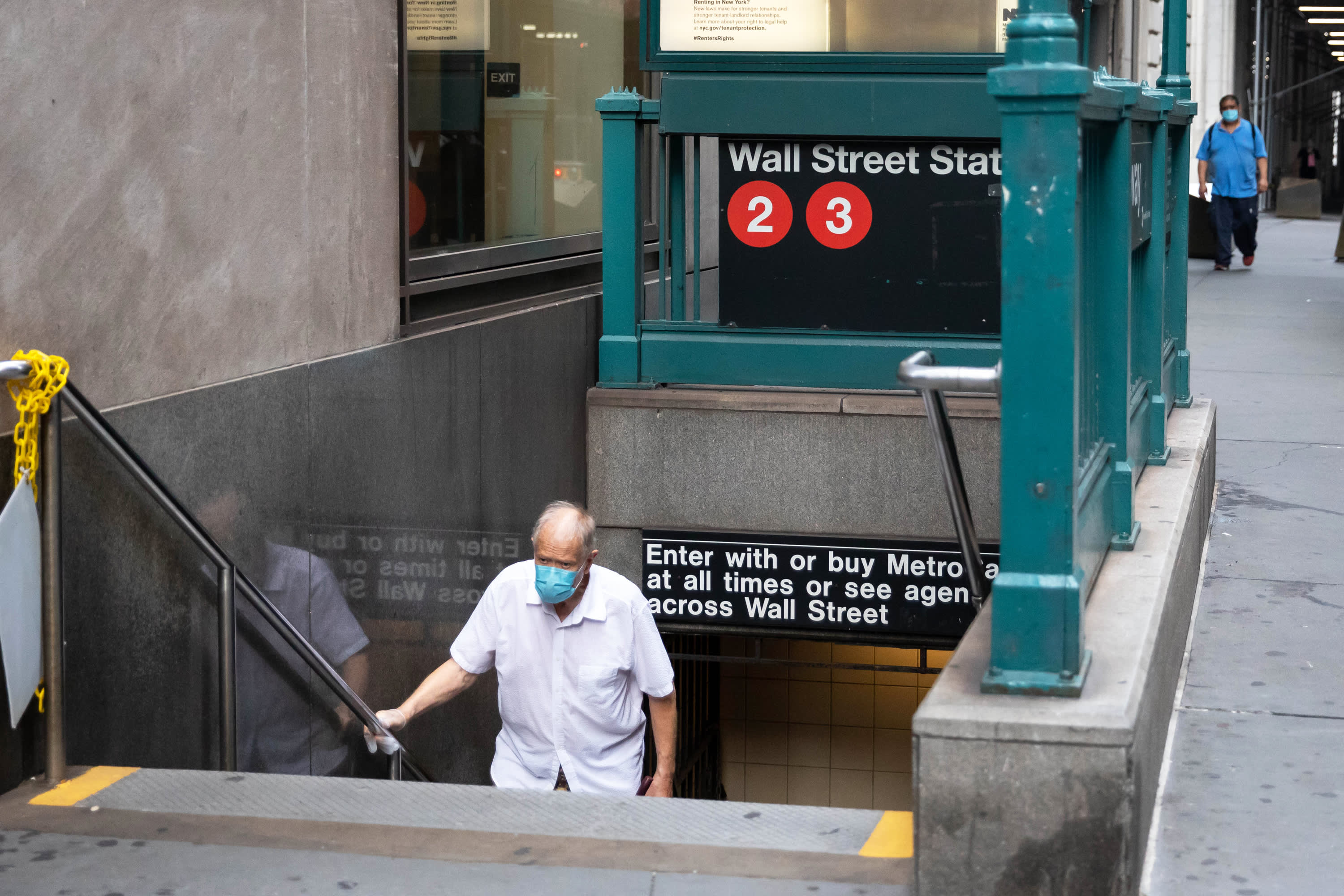
Wall Street earnings are staging a sharp recovery, but Main Street lags behind
A pedestrian wearing a protective mask exits from the Wall Street subway station in New York, on Monday, July 20, 2020.
Michael Nagle | Bloomberg | Getty Images
Wall Street is getting bulled up on earnings, and that is highlighting the divide it has with Main Street.
Earnings season is two days old, and already Wall Street pundits are optimistic.
Corporate profits "have been more resilient than we expected and we are raising our estimates," UBS chief investment strategist David Lefkowitz wrote in a report to clients. The firm is raising its earnings estimates for the S&P 500 for both the full year 2020, and full-year 2021.
Dennis DeBusschere from Evercore ISI is equally optimistic, stating that the rise in earnings would support a move in the S&P 500 toward 3,650 over the next few quarters, a 4% gain from the current level.
This, after one day of (admittedly) blowout earnings from JP Morgan, Citigroup and Blackrock? It's more than that.
Even before bank earnings, nearly two dozen companies — including heavyweights like FedEx, Lennar, and CarMax — that have already reported third-quarter earnings have beaten estimates by roughly 25%, an unusually wide earnings beat, according to Earnings Scout.
What's going on?
A combination of a slowly improving economy, a lack of earnings guidance, an overly cautious analyst community, an emphasis on corporations improving efficiency, and a belief that a vaccine will become available in early 2021 is slowly but surely nudging corporate earnings estimates higher.
Analysts, who have underestimated the extent of the corporate profit recovery, are now busily revising earnings estimates upward: "There are twice as many S&P 500 stocks receiving upward earnings revisions vs. those experiencing cuts, which is well above average levels seen over the last 40 years," Ann Larson at Bernstein noted.
The Main Street divide
But why are earnings so much better when much of Main Street is in such dire shape?
This earnings outperformance is again highlighting the difference between Wall Street — the investment economy — and Main Street — the so-called real economy.
Main Street observers have long complained of this disconnect: with GDP estimated to be down 4%-5% this year and millions out of work, how could the stock market be approaching new highs? Shouldn't there be some correlation between GDP and corporate profits?
There usually is, but Wall Street does not exactly represent Main Street, and the Covid downturn has highlighted those differences.
The main reason for the divergence is that the U.S economy is heavily weighted to services like retail, restaurants, and doctors, rather than selling goods. But the earnings profile of the S&P 500 is more heavily weighted toward companies that sell goods.
How big is the difference? UBS estimates that services comprise 83% of U.S. economic activity but only 54% of S&P 500 profits.
"This is a crucial difference because spending on goods has actually increased since the pandemic hit. In contrast, spending on services has contracted fairly sharply," Levkowitz wrote.
That goes a long way toward explaining the Wall Street/Main Street disconnect.
The strong showing from goods companies is one reason the earnings decline this time has not been nearly as bad as 2009, when both goods and services collapsed. Third-quarter earnings are expected to have declined by roughly 20% in the third quarter, but the second quarter, when earnings declined 30%, is likely the trough for earnings, UBS noted. By contrast, earnings dropped 45% in 2009 from peak to trough.
That's not all: publicly traded companies have been able to take more advantage of the Fed's programs to support the economy and have been able to raise more debt through the public markets. They also have had more exposure to the work-from-home trends that have accelerated during the pandemic, as witnessed by the huge run-up this year in shares of Apple, Microsoft, Amazon, Alphabet and Facebook.
Earnings have been so strong it's reasonable to ask, is this the best it's going to get? The issue, as UBS' Levkowitz admits, is that earnings remain hostage to Covid-19 and the elections: "The range of outcomes for S&P 500 profits remains wide due to uncertainties about: the timing of vaccine availability; the size and timing of additional fiscal stimulus; and possible changes to corporate taxes in a Democratic sweep election outcome," the firm wrote.
What about stock prices? If you're expecting a huge run-up in prices, it's already happened, with the S&P only 2% from an historic high.
"Unfortunately, price action following beats was extremely muted last quarter," Jonathan Golub at Credit Suisse noted.
